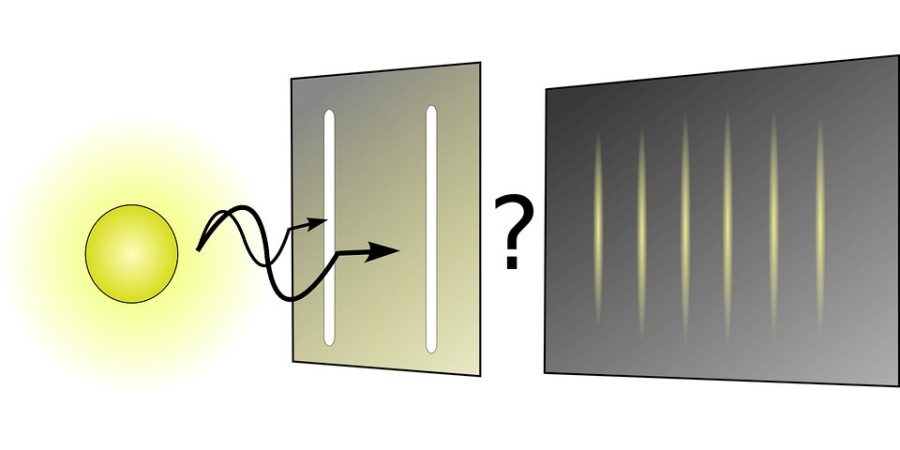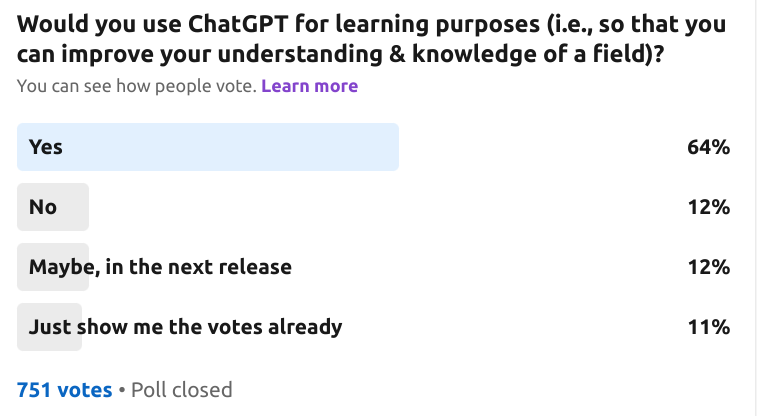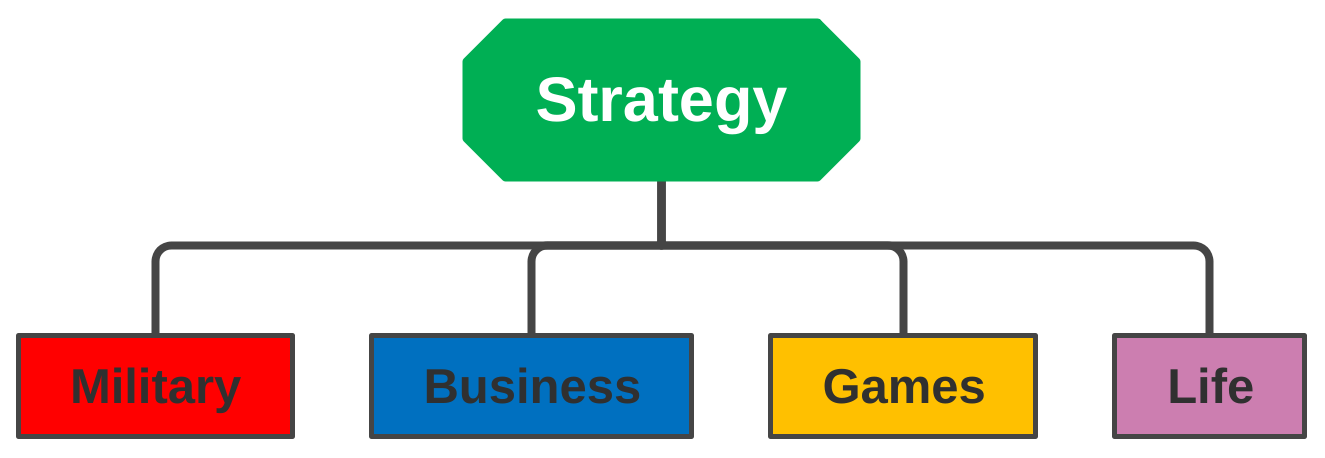How Quantum Physics Can Be Applicable to Our Thinking

The premise of this article
To put it simply, this is all about learning about a particular principle in Quantum Physics and how it is applicable to our thinking, as an upgrade of sorts. It's not a click-bait since, well, I don't get any revenue from this article, do I? Also, there is more to be gained on a collective level by adopting this insight of Quantum Physics than any social media platform could ever pay a single individual about spreading it.
Some definitions
Quantum Physics is the study of our world when it comes to a very small scale. Namely, it deals with the scale of atoms and the particles that make up these forms of matter, as well as the energy particles involved. Things like photons, for example, are also studied by QP, since they are closely linked to atoms. For example, when an electron changes orbit in a certain way, a photon is emitted, while when a photon is absorbed by an electron, it can cause it to shift to a different orbit. This may be an oversimplification but it's what got Albert Einstein his Nobel Prize in 1905, so it must be important!
Quantum states are the different states a quantum particle can take. These are not the same as the states things in our scale of the world can take, since things in the quantum realm can be counter-intuitive. That's why we often model these particles in different ways in order to fully describe their behavior. For example, an electron can be viewed as a particle (a very small ball having a negative electric charge) or a wave (much like the waves that enable our cell phones to communicate with the cell towers so that you can read this article on your smartphone). Quantum states are not clear-cut since an electron can behave as both a particle and a wave at the same time.
The marvel of superposition
Superposition is a very strange creature in Quantum Physics. It is a principle of sorts that describes what happens to the quantum state of something in relation to observation. After all, the observer plays an important role when it comes to quantum phenomena, urging scientists to think differently about our world. Note that the observer can be anything that observes the whole thing, even if it is just a camera or a machine that measures the variables involved in a quantum physics experiment.
In simple terms, superposition is that situation when something can be both A and B at the same time, until it is observed. We may think of things being this or the other, in our scale of the world, but in the quantum world things can be more fuzzy. So, in the image above, there is this bunch of electrons that is shot at this panel having two openings. Note that there is a single electron fired at any given time, much like a machine gun shoots at a given target. In this experiment, this electron gun shoots at this panel randomly, so some electrons would pass through one of the openings and some would pass through the other one, right? Well, not exactly. Until someone observes these electrons, they will all pass from both of the openings at the same time, creating a pattern like the one shown on the right part of the image. This is something we would expect to see if we were broadcasting waves through the two openings of the panel, not particles. However, until someone observes (or more practically, measures) these electrons, each one of them is a wave, interacting with itself. Otherwise, we wouldn't be seeing this strange pattern on the other side of the panel. This simple experiment illustrates the concept of superposition, since the electron is both a wave and a particle at the same time and as a result it passes through both opening A and opening B simultaneously.
How superposition applies to our thinking
If superposition enables quantum particles to be in two states at the same time, doing two contradictory things, then perhaps our minds can do the same. After all, many people have speculated that the human mind is more like a quantum computer than anything else. We don't know for sure since we haven't managed to figure out how it works exactly, something that may take a few more years at least to figure out. Whatever the case, it's not far-fetched to model the human mind as a quantum computer, i.e. a machine that operates using quantum principles. If you look into the quantum computing technology, it's all about harnessing this superposition thing to make computations that would be otherwise impossible.
Enter qubits, the elements of quantum computing. These are like conventional pieces of data (bits) that are however in a superposition state. In other words, a qubit is both 1 and 0 at the same time, until the superposition collapses. Naturally, a single qubit can't do much, but many of them working in tandem can handle very complex scenarios. That's why quantum computers are expected to be a powerful tool for figuring out how molecules interact with other molecules, on a quantum level, something impossible with traditional computers.
Anyway, if our minds operate in a similar manner, it is possible for them to hold two opposing states at the same time, being comfortable with contradicting pieces of information. This is something we often observe, as for example when someone is happy to see gunmen being punished for holding and using a gun, while the same person is happy to own a gun for self defence. Same goes with other matters that though controversial, they seem to make sense. Personally, I'm against social media (particularly Facebook) in general, but I'm happy to make an exception for beBee, for example.
All this would be impossible, if it weren't for superposition on a higher level, beyond that of the world of atoms. In other words, it is possible to hold two conflicting ideas in our minds, at least until we make up our mind about things!
What you can do to put all this into good use
So, how is all this useful? Well, when we are presented with a dilemma, particularly one that is not easy to resolve due to lack of information, we can entertain this superposition state regarding it, in our minds. Just because Mr. A says something about a certain topic, we don't need to take his word for it, even if he is an expert of sort. We can listen to what Mr. B has to say about all this too. Then we can do our research and with an open mind decide where we stand on this matter. It's easy to bypass all this process and decide about all this impulsively but chances are that this strategy of inertia is bound to yield unreliable results. Perhaps that's why in science people take their time before they adopt a theory, examining from different angles, while maintaining a superposition about it in their minds. If they can do it, perhaps so can we...
You can learn more about the science behind all this through this article here: https://www.physicsoftheuniverse.com/topics_quantum_superposition.html
As for the Quantum Computer application and qubits, this web page is a good place to start: https://computer.howstuffworks.com/quantum-computer1.htm
Articoli di Zacharias 🐝 Voulgaris
Visualizza il blog
Source: LinkedIn · For the past three years, I've had an aversion towards LinkedIn, mostly because o ...

Strategy is a broad concept involving planning and acting on a plan to tackle an often complex situa ...

I've never had any serious issues with my digestive system, but it doesn't hurt to be prepared. Afte ...
Professionisti correlati
Potresti essere interessato a questi lavori
-
Cuoco/A - Ac Hotel Clodio Roma
Trovato in: Buscojobs IT C2 - 1 giorno fa
Marriott International, Inc. BOLOGNA, ItaliaJob Number · Job Category Food and Beverage & Culinary · Location AC Hotel Bologna, Via Sebastiano Serlio 28, Bologna, Bologna, Italy VIEW ON MAP Schedule Full-Time · Located Remotely? N · Relocation? N · Position Type Non-Management · Per la nuova apertura dell'AC Hotel Clodio ...
-

Abegail cerca una babysitter o tata
Trovato in: Sitly IT C2 - 1 ora fa
Sitly Nago-torbole, Italia Tempo parzialeHi Im Abegail 43 yrs old mom with an amazing 13 month old boy. I am from South Africa married to Italian. This year I start working and require someone to assist in both nanny and a bit of small home chores. We are looking for someone who firstly love children and can be flexible ...
-

Progettista Meccanico Senior
Trovato in: Buscojobs IT C2 - 5 giorni fa
Amaris Group Sa Bari, ItaliaBari · Permanent Job · Who are we? Job descriptionEntra a far parte del network di talenti di Amaris Consulting come Ingegnere Meccanico Senior nel settore RAILWAY a Bari ( con possibilità di lavoro remoto dopo i primi due mesi) Cosa farai? Progettazione e sviluppo di component ...


Commenti
Zacharias 🐝 Voulgaris
4 anni fa #18
No one knows, until the box is opened!
Jerry Fletcher
4 anni fa #17
Zacharias 🐝 Voulgaris
4 anni fa #16
Indeed, that's why every theory needs to be tested. Perhaps that's why in the DoD, there is this hierarchy of "technology readiness" for all science-based projects (TRL). It's a simple scale of 1-10, with 1 being just on the design stage (just a theory) and 10 being hardware. Right now there are thing in QP that are on TRL 10 and others very close to that. If that doesn't make them facts, I don't know what does. And as we agreed on previously, there are things in QP that are not valid, many of which are strictly theoretical. That's OK, since that's how science evolves. As I stated very clearly in my Scientism article, science is not about provide us with all the answers, but a way of thinking that helps us find them eventually. Till then, we'll have to suffice with our scientific theories and the technology that stems from the best of them.
Phil Friedman
4 anni fa #15
"Could it be that some of the stuff QP says are valid while others are waiting to be falsified ..." Not only could it be, but it IS the case. . My core point is that QP is and remains, to a large extent, theoretical. To be clear, "accepted theory" is still a far cry from "fact". And I personally believe it stretches credulity to consider the esoteric branches of QP to be factual in any common sense of the term. . And for the record, an "accepted theory", even if confirmed by its accurate predictive capabilities, could still be wrong when considered to be a "correct" metaphysical description. Cheers!
Ian Weinberg
4 anni fa #14
#13 That's effectively nailing it Phil. Just as an aside, I read recently that entanglement was achieved between macro structures. - possible work in progress. Regarding QP, the fact that consciousness appears to be a factor of significance in collapsing the wave of superposition (and thereby bringing into existence some new physical entity/change), there can never be a defined final state because by definition things will change as soon as we engage with them. I brought up this point in one of my previous articles regarding the Large Hadron Collider - if a collection of physicists want a particle to appear badly enough (ala Higgs boson) they can materialize it without a 13.5 billion dollar machine. My personal view is that the extended reality and its components have far more properties than have been included in our potentially narrowed aperture of perception. We have merely taken what we need and what we can control and thereby established a degree of predictability and useful application. When all is said and done, the epistemology will always be relative.
Zacharias 🐝 Voulgaris
4 anni fa #13
This is the kind of response that I enjoy the most when on beBee, something I've never seen elsewhere. Even though I don't agree with you entirely, I find this conversation fascinating and illuminating. You are right in the vagueness and excessive theoretical nature of QP. Many (if not most) of the particles theorized in QP are quasi-real if not entirely invalid, much like the epicycles of the Ptolemaic model of the solar system (a model that worked pretty well nevertheless until the much simpler and more robust model took over). I don't like that stuff either, which is why I focused on a particular part of QP that is experimentally proven. Also, this particular principle is applied in technology today, so it has to have some merit. Could it be that some of the stuff QP says are valid while others are waiting to be falsified by a new and better theory of the micro-world, one more compatible with the other theories of Physics? Whatever the case, this is how science evolves and even if there are lots of people practising it while maintaining a wrong view of things, the fact that they are open to an alternative is hopeful and quite frankly, more important than all the theories they may believe in, until proven inadequate.
Phil Friedman
4 anni fa #12
You’re argument, Zacharias \ud83d\udc1d Voulgaris, is unfortunately blatantly circular. To wit, pursuing the application of QP in the macro physical world must be worthwhile because (some) scientists are doing just that — albeit without success. When what I am suggesting is that the pursuit is based on a conceptual error, a category mistake, if you will, In which case the only vindication is the successful attainment of a unified theory, something that is not even on the scientific horizon, notwithstanding the theatrics and hocus pocus promulgated by the late Stephen Hawking. . The “proof” of a theory to explain the sub-atomic world (which is not directly observable) lies in the ability of the theory to predict (or retrodict) the behaviour of phenomena in the (observable) macro physical world. Otherwise, we are talking scientifically meaningless metaphysics. One of the most unsettling characteristics of contemporary QP is the tendency .tendency to postulate new and further levels of “particles” or pseudo-particles when current theory fails in terms of predictive power — a situation analogous to the postulation of epicycles when Ptolemaic theory failed to account for apparent observable movements of celestial bodies. Cheers! .
Zacharias 🐝 Voulgaris
4 anni fa #11
Yes, the QP field is concerned with the micro-world, no doubt about that. However, if its applicability was limited to that, no one would bother with technology based on QP in our world (e.g. Quantum Computers). What's more, many physicists today work on finding ways to combine QP with Electromagnetism and Classical Physics, as well as Relativistic Physics, in a unified theory. If QP didn't apply at all to our world, this endeavour would be without merit and probably not be pursued. Even the late Prof. Hawking worked on this theory, albeit without much success. As a result, exploring the application of the superposition principle to our world is something worth trying, even if epistemologically it may not make much sense, at least for the time being.
Phil Friedman
4 anni fa #10
Phil Friedman
4 anni fa #9
Zacharias 🐝 Voulgaris
4 anni fa #8
That's a good question, Ian Weinberg. Perhaps there are ways to isolate the qubits from human observation long enough for them to map the problem the computer is tackling and possibly solve it. Given that there are so many players in this domain, I presume this is possible.
Ian Weinberg
4 anni fa #7
Cyndi wilkins
4 anni fa #6
Zacharias 🐝 Voulgaris
4 anni fa #5
Thank you for the share, Ali!
Zacharias 🐝 Voulgaris
4 anni fa #4
Debasish Majumder
4 anni fa #3
Lada 🏡 Prkic
4 anni fa #2
Ali Anani
4 anni fa #1